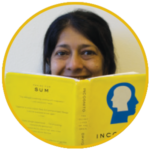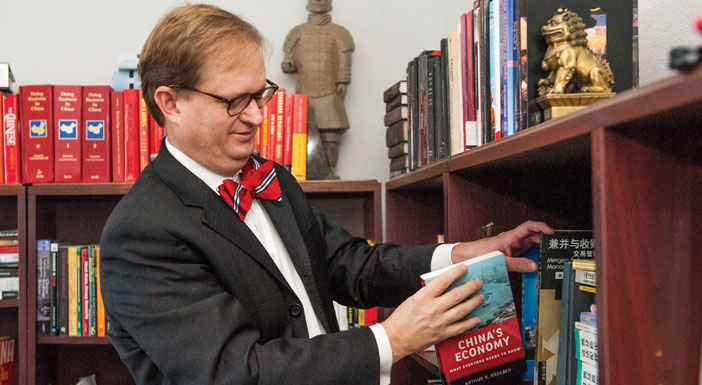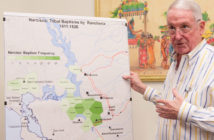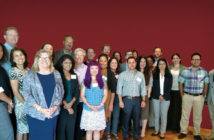What great book have you read lately? These professors share their recent reads.
by Laurie McLaughlin
Kendrick Brown (Photo by William Vasta)
Kendrick Brown
Dean of the College of Arts and Sciences
Ethical Ambition: Living a Life of Meaning and Worth
by Derrick Bell (Bloomsbury USA)
The book is about pursuing success in one’s professional life without losing a commitment to principles. It advocates living your life in a way that enables you to take ethical stances that may be unpopular, but preserve your sense of right and wrong. I recommend this to people who want to have professionally satisfying careers for which they do not sell their souls and to individuals belonging to marginalized groups who wonder about the price to be paid to attain career success. I read this book to remain connected to why I became an academic in the first place.
Next up: Breakpoint: The Changing Marketplace for Higher Education by John McGee (Johns Hopkins University Press)
Nathaniel Cline (Photo by Carlos Puma)
 Nathaniel Cline
Nathaniel Cline
Economics Professor
Austerity: The History of a Dangerous Idea
by Mark Blyth (Oxford University Press)
This important 2013 book appeared as governments around the world turned away from aggressive stimulus and focused on reducing budget deficits. Blyth examines the history of austerity—the notion that cutting government spending and borrowing will restore competitiveness and spur economic growth. The author describes the somewhat scattered intellectual history of austerity and its implementation. He argues that the notion of “expansionary austerity” is a myth, as it reduces aggregate demand, and ultimately hurts working people as key services are cut. In fact, it may not even work to decrease overall debt. He summarizes quite clearly—and with great wit—many of the arguments for public consumption.
Next up: Strangers in Their Own Land by Arlie Russell Hochschild (The New Press)
John Glover (Photo by Carlos Puma)
John Glover
History Professor
The London County Council Bomb Damage Maps, 1939-1945
by Laurence Ward (Thames & Hudson)
This is a spatial history of the German bombing of London during World War II through a collection of maps that display the damage of the Blitz across city blocks and neighborhoods. One of my current projects is studying through maps the history of Dakar, Senegal’s capital. There have been changes in Dakar’s landscape over time, and the hidden historical geography is preserved in the memories of its original inhabitants. These maps of London, originally drawn in 1916, tell a similar story of a city that to a certain degree no longer exists except in history and memory.
Next up: The Search for Takrur: Archaeological Excavations and Reconnaissance along the Middle Senegal Valley
by Roderick and Susan McIntosh and Hamady Bocoum (The Yale Peabody Museum)
Kamala Gollakota (Photo by William Vasta)
 Kamala Gollakota
Kamala Gollakota
Management Professor
Incognito: The Secret Lives of the Brain
by David Eagleman (Vintage)
This is a beautifully written book that discusses implications of the brain and mind. Eagleman discusses interesting research and opens a range of topics that border neuroscience and philosophy, such as how is it possible to get angry with ourselves? If brain chemistry can cause violent behavior, how much free will do we have and should we punish criminals? There are a range of thought-provoking ideas in the book as it delves into the conscious and subconscious mind. This was a leisure read and very different from what I read for work. I love science, and I learned so many things I didn’t know.
Next up: The Soul of an Octopus: A Surprising Exploration into the Wonder of Subconsciousness
by Sy Montgomery (Atria Books)

Walter Hutchens (Photo by Coco McKown ’04, ’10)
Walter Hutchens
University Endowed Chair in Global Business
China’s Economy: What Everyone Needs to Know
by Arthur R. Kroeber (Oxford University Press)
The book explains China’s current economy, how it got that way, and implications for China and the world. What’s happening in China’s economy is so consequential for the entire planet; I’ve been studying China for decades, and I am often puzzled and sometimes frustrated by developments there—but never bored. This book is a masterful summation and cogent analysis of an incredibly complex and important topic. I assigned the book to students in my Government and Business seminar this fall, and I read it along with them. As a macro view, China’s Economy pairs well with Evan Osnos’ Age of Ambition and Rod Schmitz’s Avenue of Eternal Happiness, two recent books that zoom into life in contemporary China.
Next up: The Beautiful Country and the Middle Kingdom: America and China, 1776 to Present
by John Pomfret (Henry Holt and Co.)
Rebecca Lyons (Photo by Coco McKown ’04, ’10)
Rebecca Lyons
Chemistry Professor
The Beekeeper’s Apprentice
by Laurie R. King (Picador/St. Martin’s Press)
Sherlock Holmes has retired and has taken up beekeeping instead of tracking criminals. He meets a troubled yet brilliant young woman, Mary Russell, and decides to take her under his wing. The book is full of the twists and turns of a Sherlock Holmes tale. Mary is what they called a “bluestocking” back then, a woman of letters, and she is every bit Holmes’s equal. She is unapologetically intellectual, and that appeals to me on so many levels. I love books that teach me about the mores and culture of different eras and settings.
Next up: Geology Underfoot in Yosemite National Park
by Allen F. Glazner and Greg Stock (Mountain Press)
Pauline Reynolds (Photo by Coco McKown ’04, ’10)
Pauline Reynolds
Higher Education Professor
A Discovery of Witches
by Deborah Harkness (Penguin Books)
Harkness creates a 21st-century alternate reality with vampires and witches as protagonists in a story that blends historical mystery with fantasy. The author is a history professor at University of Southern California, and she uses her historical expertise to bring characters and settings to life. This is the first book of a trilogy, and it offers some romantic entanglements, problem-solving, good food and wine, science, history and travel to readers, as well as some blood-sucking. The main characters are professors, and, as I study higher education in pop culture, this trilogy is a perfect “work and pleasure” treat for me.
Next up: Jonathan Strange and Mr. Norrell
by Susanna Clarke (Bloomsbury USA)



